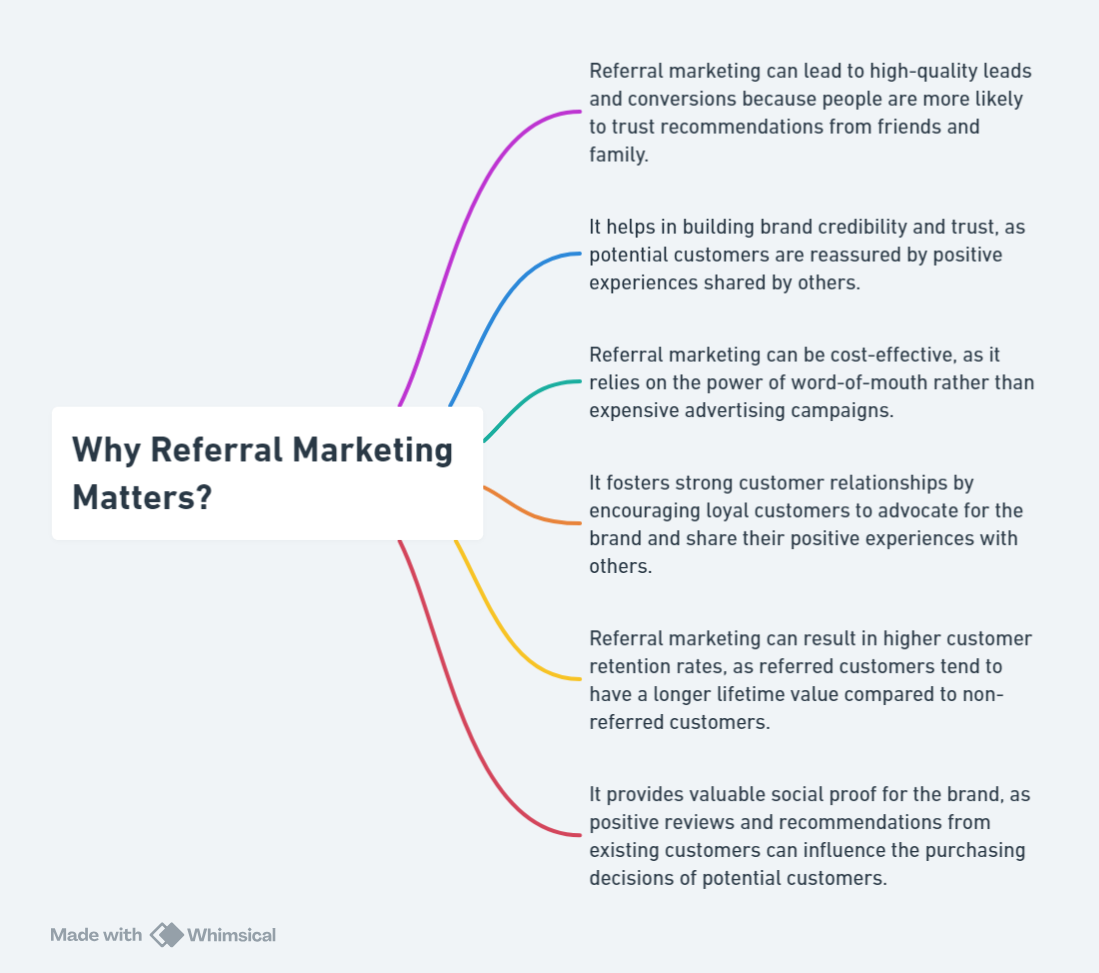In today’s competitive business landscape, referral marketing has emerged as a powerful growth strategy for agencies. By leveraging the trust and credibility of existing customers, agencies can acquire new clients at a lower cost and with higher conversion rates. This comprehensive guide will delve into the key aspects of referral marketing, providing agencies with actionable insights and strategies to maximize their success.
Why Referral Marketing Matters?

In the dynamic realm of digital marketing, the role of referral marketing agencies has become increasingly vital. These agencies specialize in leveraging the power of word-of-mouth marketing to drive growth and acquire customers. In this article, we delve into why referral marketing matters in the context of these agencies.
1. Amplifying Reach and Engagement: referral marketing agencies are adept at expanding the reach of businesses through the power of referrals. These agencies can significantly amplify brand awareness and engagement by encouraging satisfied customers to spread the word about products or services. In an era where traditional advertising can easily be ignored, referrals offer a personal touch that resonates with potential customers.
2. Building Trust and Credibility: One of the most significant advantages of referral marketing is its ability to build trust and credibility. When individuals receive recommendations from friends, family, or colleagues, they are more likely to trust the endorsed brand. Referral marketing agencies understand the importance of fostering these authentic connections and work to establish a positive reputation for their clients within their target market.
3. Cost-Effectiveness and High ROI: Compared to other forms of marketing, referral marketing is remarkably cost-effective. Referral marketing agencies leverage existing customer relationships to acquire new customers, reducing the need for extensive advertising budgets. Moreover, the return on investment (ROI) for referral marketing campaigns tends to be high, as the cost per acquisition is often lower than traditional advertising channels.
4. Leveraging Data and Analytics: In today’s digital landscape, data-driven decision-making is essential for success. Referral marketing agencies utilize advanced analytics tools to track the performance of referral campaigns, identify key metrics, and optimize strategies accordingly. By leveraging data insights, these agencies can refine their approaches to maximize results and drive sustainable growth for their clients.
5. Cultivating Long-Term Relationships: Successful referral marketing goes beyond acquiring new customers; it’s about fostering long-term relationships with existing and potential clients. Referral marketing agencies understand the importance of nurturing these relationships and focus on strategies that encourage ongoing engagement and loyalty. By consistently delivering value to customers, businesses can turn them into brand advocates who actively promote their products or services.
Top 10 Referral Marketing Books for 2024
Crafting Compelling Referral Programs

Referral marketing agencies play a crucial role in helping businesses acquire new customers through word-of-mouth. To maximize the success of their referral programs, agencies must carefully craft programs that are compelling.
1. Define Your Target Audience
The first step in creating a successful referral program is to define your target audience. This involves identifying the ideal customers who are most likely to refer others to your agency. Consider factors such as industry, company size, job title, and past referral behavior.
2. Offer Irresistible Incentives
To motivate customers to refer new business, referral marketing agencies must offer irresistible incentives. These incentives can take various forms, such as:
- Discounts on future services
- Free consultations or audits
- Exclusive access to premium content or events
- Gift cards or merchandise
- Donations to charity in the customer’s name
3. Make it Easy to Refer
Customers are more likely to refer others if the process is simple and convenient. Referral marketing agencies should make it easy for customers to refer new businesses by providing clear instructions and easy-to-use referral tools. This could include:
- Dedicated referral landing pages
- Pre-written referral emails or social media posts
- Mobile-friendly referral forms
- Automated referral tracking systems
4. Track and Reward Referrals
To ensure the success of your referral program, it is essential to track and reward referrals. This involves implementing a system to track the source of referrals and measure their impact. Agencies should also reward customers for their contributions, which can help to motivate continued referrals.
By following these steps, referral marketing agencies can create compelling referral programs that drive new business and enhance customer loyalty.
Ambassador Referral Marketing: Trends & Predictions in 2024
Leveraging Influencer Partnerships

In the realm of referral marketing agencies, leveraging influencer partnerships has emerged as a powerful strategy to amplify brand reach and drive customer referrals. This article delves into the significance of influencer collaborations and how referral marketing agencies can harness their potential to achieve marketing objectives.
1. Identifying Relevant Influencers: Referral marketing agencies begin by identifying influencers who align with their client’s brand values, target audience, and marketing objectives. These influencers possess a loyal following and credibility within their niche, making them valuable partners for spreading brand awareness and driving referrals. By carefully selecting influencers whose audience overlaps with the target market, agencies can maximize the impact of their partnerships.
2. Co-creating compelling Content: Collaborating with influencers involves more than just sponsorship; it’s about co-creating authentic and engaging content that resonates with their audience. Referral marketing agencies work closely with influencers to develop content that showcases the brand in a natural and relatable manner. Whether it’s sponsored posts, product reviews, or storytelling campaigns, the goal is to create content that encourages followers to take action and become referrals.
3. Leveraging Influencer Networks: Referral marketing agencies leverage their networks and connections to forge partnerships with influencers across various platforms and industries. These networks provide access to a diverse range of influencers, from micro-influencers with niche audiences to macro-influencers with widespread reach. By tapping into these networks, agencies can tailor their influencer partnerships to suit the specific needs and objectives of their clients.
4. Tracking Performance and ROI: Measuring the success of influencer partnerships is essential for optimizing strategies and demonstrating ROI to clients. Referral marketing agencies utilize advanced analytics tools to track key performance indicators such as engagement rates, referral conversions, and customer acquisition costs. By analyzing these metrics, agencies can assess the effectiveness of their influencer collaborations and make data-driven decisions to drive better results.
5. Fostering Long-Term Relationships: Building lasting relationships with influencers is integral to the success of referral marketing agencies’ influencer strategies. Rather than pursuing one-off collaborations, agencies focus on nurturing long-term partnerships based on mutual trust and shared objectives. This approach allows for ongoing collaboration and the opportunity to leverage influencers as brand advocates who consistently promote referrals and drive sustained growth.
Master Referral Marketing Analytics in 5 Steps in 2024
Tracking and Analyzing Referral Performance
![]()
Referral marketing agencies employ sophisticated tracking and analysis techniques to measure the performance of referral programs accurately. In this article, we explore the importance of tracking and analyzing referral performance and how it enables agencies to optimize strategies for maximum effectiveness.
1. Setting Clear Objectives: Before diving into tracking and analysis, referral marketing agencies must establish clear objectives for their referral programs. Whether the goal is to increase customer acquisition, boost brand awareness, or drive revenue, having defined objectives provides a roadmap for tracking and measuring success. By aligning tracking efforts with these objectives, agencies can ensure that their analysis yields actionable insights that drive results.
2. Implementing Tracking Mechanisms: To effectively track referral performance, referral marketing agencies utilize a variety of tracking mechanisms and technologies. This may include unique referral links, promo codes, cookies, or dedicated landing pages designed to capture referral activity. By implementing these tracking mechanisms across different channels and touchpoints, agencies can accurately attribute referrals to specific sources and campaigns.
3. Analyzing Key Metrics: Once referral data is collected, referral marketing agencies analyze key metrics to evaluate the performance of their programs. These metrics may include referral conversion rates, customer acquisition costs, lifetime value of referred customers, and return on investment (ROI). By analyzing these metrics, agencies can identify strengths, weaknesses, and opportunities for improvement within their referral programs.
4. Identifying Trends and Patterns: In addition to tracking individual metrics, referral marketing agencies identify trends and patterns within referral data to uncover insights that inform strategic decision-making. This may involve segmenting referral data by demographics, referral source, or referral channel to identify which segments are driving the most valuable referrals. By understanding these trends, agencies can tailor their strategies to target high-performing segments more effectively.
5. Iterating and Optimizing Strategies: Tracking and analyzing referral performance is an iterative process that allows referral marketing agencies to continuously optimize their strategies for maximum impact. By identifying what’s working and what’s not, agencies can make data-driven adjustments to their referral programs to improve results over time. This may involve testing different incentive structures, refining messaging, or targeting new referral channels based on insights gained from analysis.
Strategies for Boosting Physician Referral Marketing in 2024
Conclusion on referral marketing agencies

